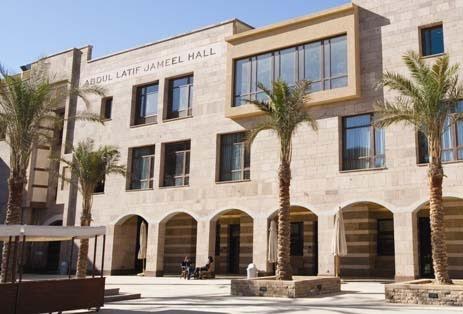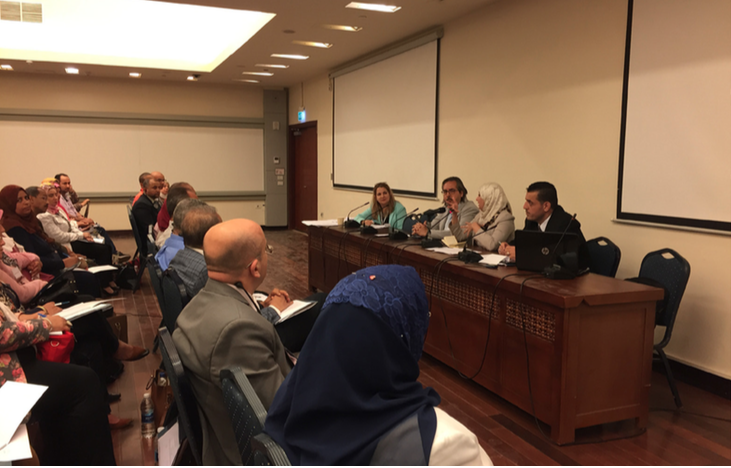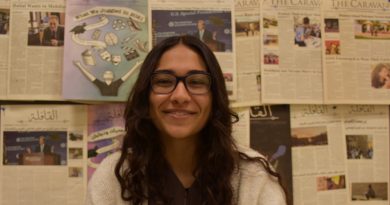GAPP Students Voice Concerns for Coming Semester
By: Maya Abouelnasr
@EmEn1125
Photo Credit: AUC Website
Amid continued student calls for a pass/fail grading system, the AUC administration met with Global Affairs and Public Policy (GAPP) students on November 16 to hear their concerns, including challenges to online instruction and assessment.
The GAPP meeting was the fourth of five school-based meetings that the AUC administration held mid-November to engage students on academic plans for the coming semester.
“The primary objective of this session is to listen to you and to hear your concerns. These concerns may have been conveyed in other ways prior to this, but this is an opportunity for you to convey personally to the administration of the school of GAPP,” Dean of Students George Marquis said.
The most recurring, pressing topic presented at the meeting pertained to reinstating the pass/fail option to alleviate the increased workload and stress.
Last spring semester, the pass/fail grading scheme, also referred to as credit/fail (CR/F), gave students the option of converting any grade for any course into a pass, given that they received a certain grade or above (C for graduate students and D for undergraduates).
GAPP Dean Nabil Fahmy highlighted the importance of considering the feasibility of students’ requests, such as pass/fail.
“We are receptive to that idea and other ideas, but not all ideas are easily implementable and they may not work later on,” Fahmy said.
He added that a major consideration of any decision taken is its effect on the quality of education, as that is the university’s top priority and as such, conclusive answers cannot be given at this time.
Fahmy further commented on the importance of working together as a community by promoting student engagement with faculty and administration.
“On the university-wide issues, I recommend encouraging students to respond to the [student evaluation] surveys in a detailed fashion,” Fahmy told The Caravan.
He added that it is crucial to get a diverse range of answers in order to better accommodate all stakeholders.
Multimedia Journalism and Political Science graduating senior and attendee Basant Samhout said at the meeting that pass/fail could be beneficial for those who are stressed, but also acknowledged that it could be misused to get out of putting in the maximum effort and time.
She added that having the option of pass/fail would serve as a boost for students to know that there’s a safety net for them to maintain their GPAs and the standards they set for themselves.
“Not all students may be able to implement this option [pass/fail] because a pass does not look good on your transcript when you’re applying to master’s degrees. A pass/fail is the last resort option for students to use, but it’s a good option to have,” Samhout told The Caravan.
In the event that pass/fail is not reinstated, Samhout recommended making use of Zoom breakout rooms to force students to interact and help foster support networks, as well as promote study groups to alleviate stress collectively.
Journalism and Mass Communication (JRMC) Professor and Chair Firas Al-Atraqchi reiterated Fahmy’s point on the importance of faculty and students working together.
“I have stressed for faculty in the Journalism and Mass Communication Department to be flexible with deadlines to ensure that the work is done promptly,” Al-Atraqchi said.
Al-Atraqchi also advised that students speak to their professors more often to allow them to better understand their concerns and accommodate accordingly, as well as serve as an alternative way to navigate workload and grade-related concerns besides pass/fail.
Acting Provost and Associate Provost for Transformative Learning and Teaching at the Center for Learning and Teaching (CLT) Aziza Ellozy talked about transparent student communication to convey concerns.
Ellozy pointed out that the feedback from the mid-semester evaluation surveys from late October did not reflect the depth of the current pressing concerns and contained few complaints, while also adding that feedback about online learning from the start of semester evaluations was also largely positive.
She added that, as a result, understanding the scale of the current issues was made tougher by the lack of detail and transparency in the evaluation survey responses.
Speaking to The Caravan, Ellozy commented on possible alternative solutions to alleviating stress such as the feasibility of peer tutoring and promoting study groups.
“I think it [peer tutoring] is a very good idea. Learning is a social experience. In other words, by learning with somebody else, it helps to crystallize your ideas better,” Ellozy said.
In addition to addressing alternative methods of navigating concerns as a community, Ellozy reiterated the need for frequent, continuous conversation between students, faculty and administration.
She suggested that these school-based meetings happen once a semester to provide a forum for this continuous conversation and to allow for more detailed communication of concerns.
“Sometimes, there’s a miscommunication or different perception that the faculty may think that things are going okay and the students feel differently. So, having the faculty and the chairs listen to the students and vice versa leads to a lot of healthy discussion,” Ellozy said.




